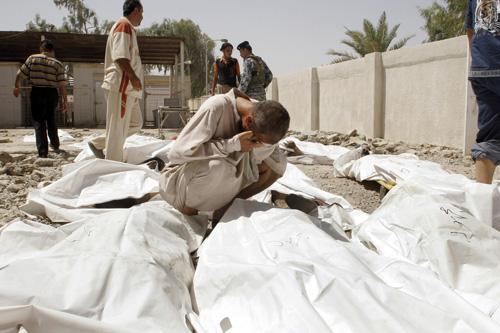Suicide blasts rock Iraq province

A man mourns next to bodies of victims of a suicide attack in Baqouba, 60 kilometers (35 miles) northeast of Baghdad, Iraq, on Tuesday. Two suicide bombers blew themselves up in a crowd of army recruits northeast of Baghdad on Tuesday, killing at least 2 The Associated Press
Jul 16, 2008
Last updated on May 13, 2016 at 12:25 p.m.
BAQOUBA, Iraq – Scattered sandals and overturned bicycles were all that remained hours after suicide bombers struck the Saad military camp.
Medical staff had finished unloading the white body bags at the nearby hospital, where the wounded moaned on bloodstained floors and weeping soldiers kneeled over slain comrades.
The twin blasts in Baqouba recalled the scenes of mass terror and grief that were almost a daily routine before last year’s steep decline in violence.
In an old tactic of Sunni extremists, two suicide bombers set off explosives among the army recruits Tuesday, killing at least 28. Violence also flared in the northern city of Mosul, where a dozen people died in bombings that targeted the Iraqi police and army.
Get The Daily Illini in your inbox!
The attack in Baqouba, capital of Diyala province, came ahead of a planned Iraqi military offensive to halt attempts by militants to regroup in the volatile area northeast of Baghdad.
Diyala is critical to Baghdad’s security because of its strategic importance as an entrance to the capital and a threat to supply routes going north. The ethnically mixed area also borders Iran, which the United States has accused of helping militants to stage attacks on American troops.
U.S. military officials said Tuesday’s attack did not reflect any increase in militant strength in the area.
“I don’t think this changes the security situation. It’s just an isolated incident. This is the way al-Qaida grabs attention,” said Maj. Jay Gentile, with the 2nd Stryker Cavalry Regiment.
The Saad camp lies in an area with a large Shiite population on the eastern outskirts of Baqouba. Sunni militants have often targeted Shiites with suicide bombings.
The bombing occurred in a field outside the entrance to the joint U.S.-Iraqi base, where recruits were signing up.
Witnesses said an initial explosion at about 8 a.m. drew a crowd that tried to evacuate victims. A second bomber then detonated his explosive vest among the rescuers.
“I lifted one of the wounded, and while I was carrying him away from the site, another explosion took place. I got hurt and the injured man suffered more injuries,” said a man who did not want to be named because of safety concerns.
A few hours after the bombing, the site had been cleared, but a large area of grass was scorched from the blast. More than a dozen pairs of sandals lay scattered, evidence of the Iraqi casualties. A dozen bicycles lay on the ground.
The explosions killed 28 people and wounded at least 57 recruits, a police official said. He spoke on condition of anonymity because he was not authorized to speak to the media.
An Iraqi military officer in Baqouba, 35 miles from Baghdad, said soldiers were among the casualties. He also spoke on condition of anonymity for the same reason.
It was the bloodiest attack in Iraq since June 17, when a truck bombing killed 63 people in Hurriyah, a Baghdad neighborhood that saw some of the worst Shiite-Sunni slaughter in 2006.
Last year, U.S. troops largely subdued militancy in Baqouba, which had been held by al-Qaida in Iraq and other Sunni extremist groups. But many insurgents were believed to have melted away and now appear to be regrouping.
The Associated Press News Research Center in New York contributed to this report.





